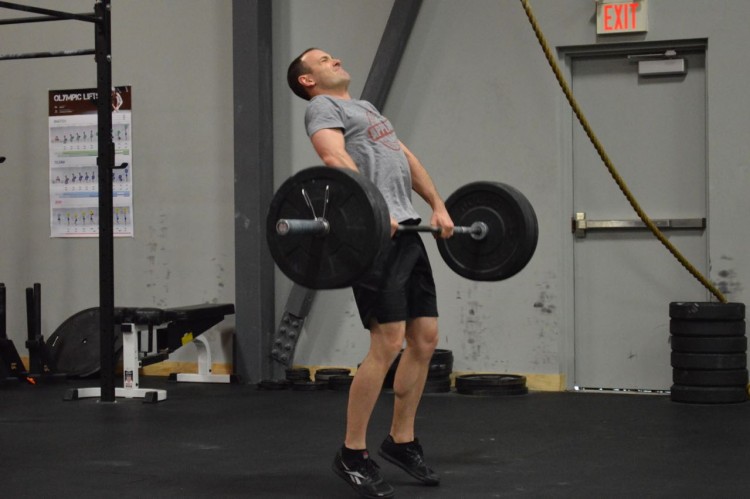What does your Lift Heavy schedule look like?
Can you please share YOUR training program?
This looks awesome! What gym has the equipment and space for me to train like this?
It seems after every Move By Design seminar, we get tons of questions like these, so I thought I’d share my own personal training framework with you.
And just to be clear I’m not suggesting that you should do exactly what I do, but simply hope to give you an idea of my general framework so that after considering your own goals and schedule you can use this to help you create your own program.
I generally Lift Heavy 3 days each week incorporating each of the following 5 components:
Step 1. Warm-up Mobility
The goal here is to prepare my body to train at a high level. I typically do the same or similar Dynamic Mobility and Foam Rolling programs that we taught you at the Move By Design Seminar.
Step 2. Skill Development
ALL of the body’s fundamental physiological requirements are based on neurology, which makes proper nerve system function vital. Insert chiropractic care here. This is also why skill development is an essential part of Move By Design. Handstands, tumbling, rope climbs, muscle ups, gymnastics, kettle bell swings and other skills should be trained consistently and fit nicely near the beginning of a training session.
Step 3. Main Lift
There is no substitute for strength. It is beneficial in all aspects of life and, therefore, the main lift, is the pinnacle of the overall training cycle.
What are the main lifts?
- Dead Lift – hip dominant movement
- Squat – knee dominant movement
- Overhead Press – vertical push movement
- Bench Press – horizontal push movement
- Pull up/ Chin up – vertical pull movement
- Row – horizontal pull movement
These form the core main lifts, but there are many variations of each that can be rotated into the training cycles for variety, change of stimulus, or alteration due to injury.
Why are these the main lifts?
These movements best mimic activities in real life. Although most people are not high-level athletes, their life can be viewed as a performance. Dead lifting mimics picking things up, squatting mimics walking up a set of stairs, and overhead pressing mimics performing work overhead.
Step 4. Accessory Lifts
The accessory lifts can be used for many different purposes:
a. To add more volume to a main lift (hypertrophy…aka growing big pipes)
b. To provide balance to a movement – a horizontal push/pull day that includes a bench press (or variation) is anterior chain dominant (pec, anterior deltoid, etc.).
Adding a pull up, inverted row, or another row variation helps balance the stress of main lift and ensure that strength is being produced uniformly throughout the body.
Step 5. Metabolic Conditioning (METCON)
Most training sessions will include a brief (5-12 minutes) METCON (short for metabolic conditioning). For example, I might do 50 barbell thrusters, followed by 30 chin-ups, followed by 30 glute ham raises as quickly as possible.
I know some of you are reading this saying, “this is great, I can do that!” and following along with every word, while others are thinking “what the heck is he talking about?”
And most of you are thinking “ok this is great but where can I go to train like this?” “What facility is going to have the proper space and equipment you need?”
That’s exactly why we’ve teamed up with CrossFit 613 to open a brand new training facility – CrossFit 613 – Powered By Life By Design, slated to open next month!
CrossFit 613 is NOT going to be a crowded, big box, machine filled, figure it out for yourself, training facility.
We will be offering a model of training that perfectly addresses the movement requirements for ALL human beings.
Training sessions will be comprised of constantly varied functional movements (like pushing, pulling, squatting, lifting, running) executed at high intensity. You will not find any machines – instead, you will find kettlebells, barbells, medicine balls, sleds, and tons of open space for running, jumping, climbing, lifting, and throwing.
The workouts themselves are completely scalable and sustainable which means that a new participant and a CrossFit veteran can complete the same workout with simple changes in load and intensity. It truly is elite fitness for everyone.
And best of all, if you choose to join us and train at CrossFit 613, you can completely ignore everything I said above because we will take care of all of that for you.
To find out more about the NEW CrossFit 613, and get priority access to our introductory memberships and pricing visit www.CrossFit613.com.
Now we’d like to hear from you? Does your training program look like this? If not how is it different and why? Are you seeing the results you want form your current training program? What have you heard about CrossFit?
 Dr. Michael Gibson has committed himself to helping others to live the best life possible. After graduating with a Bachelor of Kinesiology from the University of Western Ontario, he received his Doctor of Chiropractic Degree and Masters of Science in Chiropractic Sports Science from Life University. He is the co-creator of Life By Design, owner of The Wellness Group, and co-owner of CrossFit 613. His passion for empowering families runs deep. After experiencing the loss of his sister due to illness, Michael’s purpose became reaching and teaching as many as possible the foundational principles of an extraordinary life. Since that time he has passionately pursued and been successful in living out his dream. He maintains a busy family chiropractic practice, a full speaking schedule and finds time to implement the principles and practices of Life By Design in his own life.
Dr. Michael Gibson has committed himself to helping others to live the best life possible. After graduating with a Bachelor of Kinesiology from the University of Western Ontario, he received his Doctor of Chiropractic Degree and Masters of Science in Chiropractic Sports Science from Life University. He is the co-creator of Life By Design, owner of The Wellness Group, and co-owner of CrossFit 613. His passion for empowering families runs deep. After experiencing the loss of his sister due to illness, Michael’s purpose became reaching and teaching as many as possible the foundational principles of an extraordinary life. Since that time he has passionately pursued and been successful in living out his dream. He maintains a busy family chiropractic practice, a full speaking schedule and finds time to implement the principles and practices of Life By Design in his own life.
